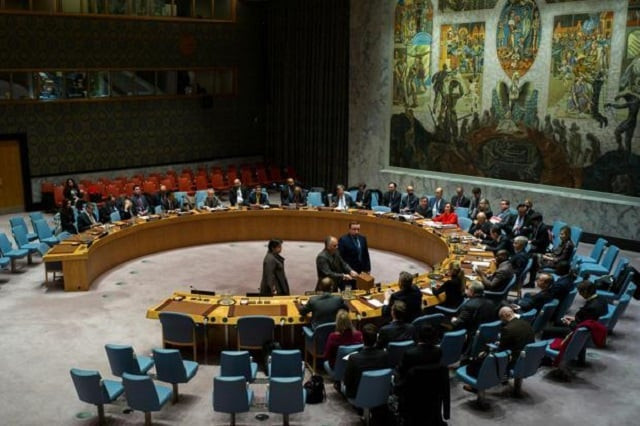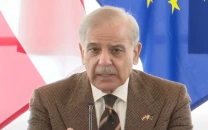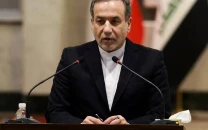India’s nominee re-elected to ICJ after UK pull-out
The election is significant for Pakistan in view of the case of alleged Indian spy Kulbhushan Jadhav

United Nations Security Council members cast their vote during a meeting on the election of five members of the International Court of Justice, at the UN headquarters in New York.
PHOTO: AFP
It will be the first time since the ICJ was established in 1945 that there will be no British judge.
The election had turned into a stalemate between Britain’s candidate Christopher Greenwood, who enjoyed support in the UN Security Council, and India’s judge Dalveer Bhandari, who won the vote in the General Assembly.
“The UK has concluded that it is wrong to continue to take up the valuable time of the Security Council and the UN General Assembly with further rounds of elections,” British Ambassador Matthew Rycroft said Monday.
“We are naturally disappointed, but it was a competitive field with six strong candidates.”
Greenwood had served one nine-year term at the ICJ based in The Hague and was seeking to serve a second.
Judge re-election: Dalveer-Greenwood stalemate at ICJ
Some diplomats attributed Britain’s failure to rally support for its candidate at the General Assembly to a loss of influence, following London’s decision to leave the European Union.
In June, the General Assembly voted to refer the legal status of the British-ruled Chagos Islands to the ICJ.
The other elected judges were Nawaf Salam of Lebanon, Ronny Abraham of France, Abdulqawi Ahmed Yusuf of Somalia and Antonio Augusto Cancado Trindade of Brazil.
Based in The Hague, the ICJ has a bench of 15 judges, five of whom are elected every three years for a nine-year term.
Established in 1945, the role of the ICJ is to settle, in accordance with international law, legal disputes submitted to it by states and to give advisory opinions on legal questions.
The permanent members of the Security Council -- the US, Russia, France and China -- were understood to have been throwing their weight behind 62-year-old Greenwood.
Rycroft thanked judge Greenwood for his service and paid tribute to his outstanding contribution to the working of the court and to the development of international law.
However, the British Ambassador noted that this was the right time to adopt the joint conference mechanism, which he had pushed earlier, but was opposed by India.
UK victory over India at ICJ suits Pakistan
The statue of the ICJ provides in its Article 12 that if after the third meeting, one or more seats still remain unfilled, a joint conference may be formed any time at the request of either the General Assembly or the Security Council for the purpose of choosing one name for each seat still vacant to submit to the General Assembly and the Security Council for their respective acceptance, the letter said.
“This mechanism has not been used in relation to an election for the International Court of Justice. However the fact that it has not been used does not mean that it should not be used when the need arises,” the letter said.
“It is the view of the United Kingdom that this election would have been an ideal of what was the mechanism envisaged by the courts upon statute to break the current deadlock,” it said.
“It is also the UK’s view as that of other delegations that some thought needs to be given to these proceedings before the next election in order that it might be used when it is really needed,” the British Ambassador said.
Thereafter both the presidents of the General Assembly and the Security Council announced that the new ballot papers would have only the name of Bhandari.
In the fourth round, Bhandari had received a majority -- 115 votes -- in the General Assembly, while Greenwood received 76 votes.
However, in the 15-member Security Council Greenwood got majority (nine) of the votes as against six votes by Bhandari.
As a result, another round of votes was scheduled for Monday.
With additional input from News Desk


















COMMENTS
Comments are moderated and generally will be posted if they are on-topic and not abusive.
For more information, please see our Comments FAQ